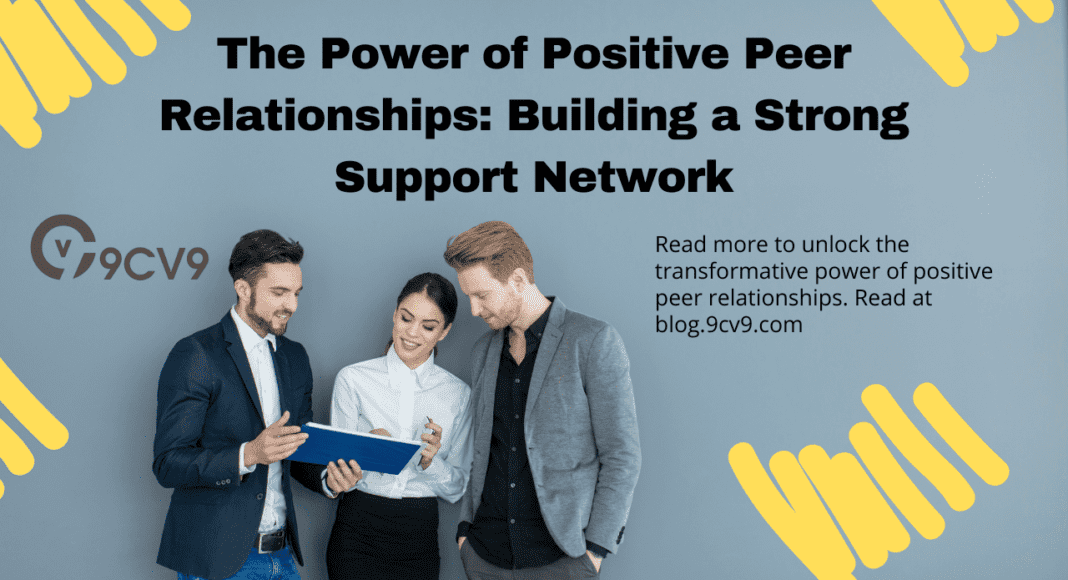Key Takeaways
- Foster Personal Growth: Positive peer relationships act as catalysts for personal growth, instilling self-confidence, emotional intelligence, and resilience.
- Create a Supportive Environment: Cultivate a strong support network by embracing inclusivity, effective communication, and empathy to build enduring and uplifting friendships.
- Transformative Impact: Discover the transformative impact of positive peer relationships in promoting well-being, academic success, and a sense of belonging within a compassionate social ecosystem.
In the intricate tapestry of human existence, there exists an undeniable truth – we are social beings, intrinsically woven together by the threads of connection and camaraderie.
From the very first moments of our lives, we seek out companionship, forging bonds that shape the course of our journey.
Among these bonds, none hold more influence than the profound impact of positive peer relationships – the lifeblood of a strong and resilient support network.
Imagine a world where every individual found solace in the warmth of understanding hearts, where empathy flowed freely, and where genuine encouragement breathed life into dreams.
A world where the weight of trials was shared and lightened by the collective strength of a support network built on trust, respect, and kindness.
Such a world is not an elusive utopia, but rather an achievable reality, waiting to be unlocked through the power of positive peer relationships.
In this blog, we embark on a transformative expedition, delving into the profound significance of nurturing positive peer connections and how they lay the foundation for a robust support network capable of withstanding life’s tempests.
Together, we shall traverse through the intricacies of these relationships, uncovering the gems of wisdom that await us in the realm of social interconnectedness.
At the heart of every meaningful interaction lies the crucible of positive peer relationships. Unlike the fleeting encounters that grace our lives like passing whispers, these connections are the cornerstones of our emotional infrastructure.
They hold the power to shape our perceptions, attitudes, and ultimately, our destinies.
So, what defines a positive peer relationship? Picture a garden adorned with blooming flowers, each representing a virtue essential to the growth of these connections.
Mutual trust acts as fertile soil, nurturing the roots of friendship to withstand the winds of doubt and uncertainty. Respect serves as the radiant sunlight, illuminating the path to understanding and acceptance.
Like a gentle rain, support cascades upon one another, fostering an environment where dreams can flourish and ambitions take flight.
Beyond the surface lies the unseen web of support, intricately woven with threads of compassion, empathy, and encouragement.
Each thread represents an individual who extends a helping hand, a listening ear, or a heartfelt cheer.
Together, they form a safety net that catches us when we stumble, offering the reassurance that we are never alone in our struggles.
Within this tapestry, friendships are the master weavers, threading connections that span the gamut of age, culture, and experience.
From the tender bonds of childhood innocence to the time-tested friendships of old age, each connection contributes to the resilience of the whole.
As we embrace the power of positive peer relationships, we find ourselves entwined in this web, embraced by its strength, and inspired by its collective spirit.
Just as a pebble cast into a tranquil pond sends ripples across the water’s surface, the impact of positive peer relationships extends far beyond the individual.
Our connections have the power to shape the communities we inhabit, creating waves of change that ripple through society.
When individuals thrive within the nurturing embrace of supportive friendships, their sense of belonging and well-being flourish.
As a result, they become catalysts for kindness, radiating positivity and empathy to those around them. The ripple effect magnifies, transforming neighborhoods, schools, and workplaces into sanctuaries of camaraderie and collaboration.
In this unfolding narrative of the power of positive peer relationships, we discover that the essence of humanity lies not in solitary existence, but in our profound capacity to connect with one another.
As we nurture these connections and weave the fabric of a strong support network, we unlock the doors to resilience, growth, and happiness.
Join us on this expedition of the heart, as we unravel the mysteries of positive peer relationships and unearth the treasures that lie within.
Together, we shall set forth on a journey of self-discovery, camaraderie, and empowerment.
Embrace the power of positive peer relationships, for within them lies the key to building a strong support network and, ultimately, a more compassionate and united world.
Before we venture further into this article, we like to share who we are and what we do.
About 9cv9
9cv9 is a business tech startup based in Singapore and Asia, with a strong presence all over the world.
With over six years of startup and business experience, and being highly involved in connecting with thousands of companies and startups, the 9cv9 team has listed some important learning points in this overview of the guide on The Power of Positive Peer Relationships and How to Build a Strong Support Network.
If you are looking for a job or an internship, click over to use the 9cv9 Job Portal to find your next top job and internship now.
The Power of Positive Peer Relationships: Building a Strong Support Network
- Understanding Positive Peer Relationships
- Benefits of a Strong Support Network
- Building Positive Peer Relationships
- Nurturing Supportive Friendships
- The Impact of Positive Peer Relationships on Personal Growth
- Cultivating a Supportive Environment
- Overcoming Challenges in Peer Relationships
1. Understanding Positive Peer Relationships

In the realm of human interactions, peer relationships stand as a cornerstone of social development and emotional well-being.
Understanding the dynamics of positive peer relationships empowers us to foster supportive connections that can transform lives and create lasting impacts.
In this section, we embark on a journey of exploration, delving into the profound significance of positive peer relationships and the various aspects that contribute to their nurturing.
1. Defining Positive Peer Relationships: Positive peer relationships are characterized by empathy, mutual respect, trust, and support.
These connections serve as a safe harbor where individuals can express themselves authentically, without fear of judgment.
A study published revealed that individuals who reported having positive peer relationships experienced higher levels of life satisfaction and overall well-being, underscoring the importance of these connections in fostering happiness and resilience.
2. The Impact of Positive Peer Relationships on Mental Health: Positive peer relationships play a pivotal role in mental health, providing a buffer against stress and anxiety.
According to a comprehensive review, individuals with strong peer support are less likely to experience symptoms of depression and have a reduced risk of developing mental health disorders.
3. Building Empathy and Emotional Intelligence: Positive peer relationships offer a fertile ground for the development of empathy and emotional intelligence.
When individuals engage in compassionate interactions with their peers, they enhance their ability to understand and resonate with the emotions of others.
A research study published found that children who engaged in positive peer relationships showed higher levels of emotional intelligence and were better equipped to manage interpersonal conflicts.
4. Cultivating Effective Communication Skills: Positive peer relationships nurture effective communication skills, allowing individuals to express themselves clearly and assertively.
The ability to communicate openly and respectfully fosters a culture of trust and understanding within peer groups.
For instance, in a study, respondents believed that effective communication is essential for maintaining positive peer relationships.
5. Academic and Professional Advantages: Positive peer relationships extend their influence into academic and professional spheres.
Studies have shown that students who engage in supportive peer groups tend to have higher academic achievement and motivation.
Similarly, in the workplace, positive peer relationships contribute to higher job satisfaction, increased productivity, and reduced turnover rates.
Understanding the essence of positive peer relationships unveils the transformative power they hold in shaping our lives.
From bolstering mental health to enriching academic and professional pursuits, these connections serve as pillars of support and growth.
Cultivating empathy, effective communication, and emotional intelligence within peer interactions not only benefits individuals but radiates positive influences throughout communities and societies.
Embrace the beauty of positive peer relationships, for within them lies the potential to create a world where understanding, kindness, and genuine connections flourish.
2. Benefits of a Strong Support Network

A strong support network stands as a cornerstone of emotional well-being, offering a sense of belonging and resilience during life’s challenges.
In this section, we delve into the myriad benefits that arise from cultivating a robust support system, exploring the profound impact it has on mental health, physical health, and overall life satisfaction.
Let us embark on a journey of discovery, uncovering the tangible advantages that a strong support network brings to individuals and communities alike.
1. Mental Health and Emotional Resilience: One of the most significant benefits of a strong support network lies in its positive impact on mental health.
According to a study, individuals with stronger social ties are less likely to experience symptoms of anxiety and depression.
These connections act as buffers against stress and adversity, providing emotional support and a safe space to express feelings and concerns.
For instance, a study conducted found that individuals with close friends or family members to confide in were more likely to report better emotional well-being.
2. Physical Health and Longevity: Believe it or not, a strong support network also exerts a positive influence on physical health and longevity.
Research conducted revealed that individuals with strong social connections have a 50% higher likelihood of survival over a given time period compared to those with weaker social ties.
Social engagement and emotional support have been linked to improved cardiovascular health, immune function, and reduced risk of chronic illnesses.
A study published found that individuals with a close-knit social network experienced lower blood pressure and improved overall cardiovascular health.
3. Coping with Life Transitions: Life is replete with transitions, both joyful and challenging.
During times of significant change, a strong support network becomes a crucial anchor, providing guidance and reassurance.
For example, new parents with a supportive network of friends and family members often find themselves better equipped to navigate the challenges of parenthood.
Conversely, during difficult life events such as the loss of a loved one or career setbacks, a strong support network offers solace, understanding, and the strength to heal and move forward.
4. Enhanced Self-Esteem and Confidence: Positive and encouraging relationships within a support network contribute to enhanced self-esteem and self-confidence.
When individuals receive validation and affirmation from their peers, they are more likely to believe in their abilities and pursue their goals with conviction.
This sense of self-worth is crucial in promoting personal growth and achieving success.
Research conducted demonstrated that adolescents with strong peer support displayed higher levels of self-esteem and were more willing to take on challenges.
5. Stress Reduction and Coping Mechanisms: In times of stress and adversity, a strong support network can serve as a safety net, providing various coping mechanisms.
For instance, engaging in social activities with friends, participating in support groups, or simply venting to a trusted confidant can alleviate stress and improve overall well-being.
The benefits of a strong support network ripple through the fabric of our lives, nurturing mental and physical well-being, fostering resilience, and instilling a profound sense of belonging.
From offering a shoulder to lean on during challenging times to celebrating our triumphs, these connections enrich our existence and elevate us to new heights.
Embrace the power of a strong support network, for within its embrace lies the foundation of a life well-lived – one filled with love, understanding, and unwavering support.
3. Building Positive Peer Relationships

Building positive peer relationships is an art that fosters the foundation for meaningful connections and enriching social experiences.
In this section, we delve into the strategies and principles that empower individuals to create lasting bonds based on trust, empathy, and mutual respect.
By understanding the dynamics of positive peer interactions, we unlock the potential to nurture supportive friendships that enhance our well-being and contribute to a harmonious social ecosystem.
1. Active Involvement in Social Activities: Active involvement in social activities serves as a catalyst for building positive peer relationships.
Engaging in group settings and community events provides opportunities to meet like-minded individuals who share common interests and values.
Example: Consider a scenario where a group of students joins a volunteer organization to clean up their local park. Through their shared commitment to environmental conservation, they forge positive peer relationships while making a tangible difference in their community.
2. Effective Communication and Active Listening: Communication forms the bedrock of any relationship.
Nurturing positive peer interactions involves practicing effective communication and active listening. Being attentive to others’ perspectives, feelings, and experiences fosters understanding and empathy.
According to research published, effective listening enhances relationship satisfaction and overall closeness between peers.
Example: In a group project setting, students who actively listen to each other’s ideas and openly communicate their thoughts experience a more collaborative and harmonious work dynamic, leading to a successful outcome.
3. Supporting and Encouraging Each Other: A hallmark of positive peer relationships is the unwavering support and encouragement shared among friends.
By celebrating each other’s successes and offering a helping hand during challenging times, individuals reinforce the bonds of trust and camaraderie.
According to a study published in the Journal of Personality and Social Psychology, providing support to peers is linked to higher levels of perceived friendship quality (Source: American Psychological Association).
Example: In a sports team setting, players who actively cheer for and encourage their teammates build a cohesive and motivated group, resulting in improved team performance.
4. Embracing Diversity and Inclusion: Creating a positive peer environment involves embracing diversity and fostering inclusion.
Encouraging diverse perspectives and respecting individual differences enriches the fabric of friendships.
According to a report by Deloitte, organizations with inclusive cultures are 2 times more likely to meet or exceed financial targets.
The same principle applies to peer relationships, as embracing diversity leads to a broader range of insights and experiences.
Example: A study conducted found that diverse teams outperformed homogenous teams by making more accurate and innovative decisions.
5. Conflict Resolution and Empathy: Conflict is a natural part of any relationship. Navigating disagreements with empathy and respect is essential for maintaining positive peer interactions.
The ability to address conflicts constructively strengthens trust and mutual understanding.
Research published showed that adolescents who utilized empathy during conflicts reported higher relationship satisfaction.
Example: Two friends who encounter a disagreement take the time to actively listen to each other’s perspectives, show empathy, and find common ground, ultimately deepening their bond through effective conflict resolution.
Building positive peer relationships requires intention, effort, and a genuine desire to create meaningful connections.
By actively participating in social activities, practicing effective communication and active listening, supporting and encouraging one another, embracing diversity, and resolving conflicts with empathy, we cultivate an environment where positive peer relationships can thrive.
These connections enrich our lives, foster emotional well-being, and contribute to a nurturing and inclusive social fabric that benefits individuals and society as a whole.
Embrace the art of building positive peer relationships, for within it lies the essence of meaningful human connections.
4. Nurturing Supportive Friendships

Supportive friendships are the lifeblood of our emotional well-being, offering a sanctuary of understanding and encouragement in an ever-changing world.
In this section, we delve into the art of nurturing and sustaining these precious bonds, exploring the strategies and principles that foster lasting, supportive friendships.
By understanding the essential elements that nourish these relationships, we empower ourselves to cultivate meaningful connections that stand the test of time.
1. Being a Good Listener: One of the foundational pillars of nurturing supportive friendships is the art of active listening.
Taking the time to truly listen and understand a friend’s thoughts and feelings communicates care and validation.
According to a study, active listening is strongly associated with relationship satisfaction and emotional intimacy.
Example: When a friend shares their triumphs and challenges, being fully present and engaged in the conversation strengthens the bond and creates a sense of trust and emotional connection.
2. Offering Empathetic Support: Empathy forms the heart of supportive friendships, allowing us to step into our friends’ shoes and share in their joys and sorrows.
Expressing empathy demonstrates compassion and understanding, reinforcing the notion that we are there for each other in both good and difficult times.
Example: When a friend faces a challenging situation, expressing empathy and providing a listening ear can provide immense comfort and support.
3. Celebrating Each Other’s Successes: Supportive friendships are characterized by genuine happiness for each other’s accomplishments.
Celebrating achievements, big or small, strengthens the sense of camaraderie and reinforces the notion that friends are each other’s biggest cheerleaders.
According to a survey, employees who felt recognized and appreciated by their peers were 14% more likely to show a higher level of engagement at work.
Example: A friend who congratulates another on a promotion or a personal achievement strengthens the bond of friendship and fosters an environment of encouragement and support.
4. Being Available and Reliable: Reliability is a cornerstone of supportive friendships.
Being there for our friends during times of need, providing a helping hand, or offering a shoulder to lean on reinforces the trust and dependability that define lasting connections.
A survey conducted found that 23% of respondents valued reliability as a crucial trait in a friend.
Example: A friend who consistently shows up to support others during important events or challenging situations solidifies their role as a reliable and trustworthy companion.
5. Resolving Conflicts with Respect and Openness: Conflict is a natural part of any relationship, and nurturing supportive friendships involves addressing disagreements with respect and openness.
Constructive conflict resolution strengthens the bond between friends and fosters deeper understanding and growth.
According to a study published, individuals who engaged in constructive conflict resolution had higher relationship satisfaction.
Example: Friends who openly discuss their differences and work towards finding common ground cultivate a stronger and more resilient friendship.
Nurturing supportive friendships is an art that enriches our lives and brings joy and comfort to our hearts.
By actively practicing active listening, offering empathetic support, celebrating each other’s successes, being reliable and available, and resolving conflicts with respect and openness, we cultivate an environment of understanding and encouragement.
These bonds of friendship become a pillar of emotional support, empowering us to navigate life’s challenges with grace and resilience.
Embrace the art of nurturing supportive friendships, for within these connections lies the essence of human compassion and companionship.
5. The Impact of Positive Peer Relationships on Personal Growth

Positive peer relationships serve as powerful catalysts for personal growth, fostering an environment of support and encouragement that empowers individuals to flourish.
In this section, we explore the profound impact that these connections have on our journey of self-discovery and development.
By understanding the ways in which positive peer relationships contribute to personal growth, we unveil the transformative potential of genuine and uplifting connections.
1. Cultivating Self-Confidence and Self-Esteem: Positive peer relationships play a pivotal role in cultivating self-confidence and self-esteem.
Supportive friends provide validation and affirmation, instilling a sense of worthiness and belief in one’s abilities.
According to research, adolescents who experienced positive peer support displayed higher levels of self-esteem and self-worth.
Example: A teenager who is consistently encouraged by their friends to pursue their passions and talents develops a strong sense of self-confidence, enabling them to take on new challenges and pursue their dreams.
2. Nurturing Emotional Intelligence and Empathy: Positive peer relationships offer a fertile ground for nurturing emotional intelligence and empathy.
Engaging in compassionate interactions with friends fosters the ability to understand and connect with others’ emotions and perspectives.
According to a study published, positive peer interactions during early childhood were linked to higher emotional intelligence in adolescence.
Example: A child who is surrounded by empathetic friends learns to recognize and respond to the emotions of others, developing strong emotional intelligence that benefits their relationships throughout life.
3. Providing Constructive Feedback and Growth Opportunities: Positive peer relationships offer a safe space for constructive feedback, encouraging personal growth and development.
Friends who provide honest and supportive feedback help each other identify areas for improvement and build upon their strengths.
A study conducted by researchers found that constructive feedback from peers positively influenced students’ academic performance and motivation.
Example: A colleague who provides constructive feedback on a project helps their friend identify ways to enhance their skills and expertise, leading to professional growth and development.
4. Inspiring Ambition and Goal Setting: Positive peer relationships inspire ambition and goal setting by setting an example of personal achievement and growth.
Friends who actively pursue their aspirations and support each other’s endeavors create a culture of ambition and motivation.
According to an article, individuals were more likely to set and achieve their goals when surrounded by friends with similar ambitions.
Example: A group of friends who share their career aspirations and actively support each other’s professional development inspire one another to reach new heights and accomplish their dreams.
5. Fostering Resilience and Coping Skills: Positive peer relationships foster resilience and coping skills by providing a network of support during difficult times.
Friends who offer understanding and encouragement help individuals navigate life’s challenges with greater fortitude and optimism.
Research published showed that adolescents with supportive peer networks demonstrated higher levels of resilience and coping abilities.
Example: A friend who provides emotional support during a challenging period empowers their companion to bounce back from adversity and grow stronger through the experience.
The impact of positive peer relationships on personal growth is profound, shaping individuals into resilient, empathetic, and confident beings.
These connections nurture emotional intelligence, inspire ambition, and foster a sense of belonging that empowers us to embrace our full potential.
Through genuine and uplifting friendships, we embark on a transformative journey of self-discovery, reaching new heights of personal growth and development.
Embrace the power of positive peer relationships, for within them lies the key to unlocking our inner strength and embracing the boundless possibilities of personal growth.
6. Cultivating a Supportive Environment

Cultivating a supportive environment is an essential aspect of fostering positive peer relationships and promoting individual growth and well-being.
In this section, we explore the strategies and practices that contribute to creating a nurturing atmosphere where empathy, encouragement, and mutual respect flourish.
By understanding the importance of a supportive environment, we unlock the potential to build stronger connections and uplift those around us.
1. Emphasizing Inclusivity and Diversity: A supportive environment begins with an emphasis on inclusivity and diversity.
Embracing individuals from various backgrounds and perspectives enriches the fabric of social interactions and creates a sense of belonging.
According to a study published in the journal PNAS, diverse social networks were associated with increased well-being and happiness.
Example: A workplace that actively promotes diversity and inclusion attracts a wide range of talent and fosters an atmosphere of creativity and collaboration.
2. Encouraging Positive Communication: Positive communication is a cornerstone of a supportive environment.
Encouraging open and respectful dialogue nurtures trust and strengthens relationships.
According to research conducted by Harvard Business Review, teams with a positive communication culture outperform those with negative communication culture.
Example: A classroom where students are encouraged to share their thoughts and ideas openly without fear of judgment fosters a supportive learning environment that stimulates creativity and engagement.
3. Promoting Empathy and Compassion: Empathy and compassion are vital components of a supportive environment.
Cultivating understanding and care for others’ feelings and experiences builds deeper connections.
A study published found that promoting empathy in individuals led to increased prosocial behavior.
Example: An organization that encourages employees to engage in volunteer activities for community causes fosters a culture of compassion and social responsibility.
4. Providing Resources and Support Systems: Supportive environments offer resources and support systems to individuals in times of need.
Providing access to counseling services, mentoring programs, or peer support groups creates a safety net for personal growth and well-being.
According to a report, offering mental health support programs in the workplace can reduce absenteeism.
Example: A university that offers academic counseling and mental health services helps students navigate challenges and enhances their academic success.
5. Celebrating Achievements and Milestones: Recognizing and celebrating achievements and milestones is a key element of a supportive environment.
Commending individuals’ successes fosters a culture of positivity and motivation.
According to a study published, celebrating achievements enhances self-esteem and intrinsic motivation.
Example: A team that acknowledges and celebrates the completion of a challenging project not only boosts team morale but also encourages future high-performance efforts.
Cultivating a supportive environment is a journey of intention and dedication, but its rewards are immeasurable.
By embracing inclusivity and diversity, encouraging positive communication, promoting empathy and compassion, providing resources and support systems, and celebrating achievements, we create a nurturing space where individuals can thrive and flourish.
These supportive environments foster positive peer relationships, promote individual growth, and contribute to the betterment of communities and society as a whole.
Embrace the power of a supportive environment, for within its embrace lies the potential to uplift and empower those around us.
7. Overcoming Challenges in Peer Relationships

Peer relationships are not exempt from challenges, as the complexities of human interactions can sometimes lead to misunderstandings and conflicts.
In this section, we explore the common challenges faced in peer relationships and provide strategies to overcome these obstacles.
By understanding how to navigate challenges effectively, we can foster healthier and more resilient connections that stand the test of time.
1. Communication Breakdowns: Communication breakdowns are a prevalent challenge in peer relationships. Misunderstandings, misinterpretations, and poor listening can lead to conflicts and strain relationships.
According to research published, effective communication is a critical factor in maintaining strong and satisfying peer relationships.
Strategies for Overcoming Communication Breakdowns:
- Practice active listening: Give your full attention to the speaker and avoid interrupting.
- Use “I” statements: Express your feelings and perspectives without assigning blame.
- Seek clarification: When in doubt, ask for clarification to avoid misunderstandings.
Example: Two friends who have a disagreement about plans for the weekend can overcome the challenge by actively listening to each other’s preferences and finding a compromise that satisfies both.
2. Resolving Conflicts Constructively: Conflict is a natural part of any relationship. The way conflicts are resolved can significantly impact the health of peer relationships.
According to a study published, constructive conflict resolution leads to higher relationship satisfaction.
Strategies for Constructive Conflict Resolution:
- Stay calm and composed: Avoid reacting impulsively during conflicts.
- Focus on the issue, not the person: Address the problem at hand rather than attacking the individual.
- Find common ground: Identify shared interests and work towards a mutually acceptable solution.
Example: Two friends who have different perspectives on a topic can engage in open and respectful dialogue to find common ground and maintain their friendship despite their differences.
3. Handling Peer Pressure: Peer pressure can be a significant challenge in peer relationships, particularly during adolescence.
The desire to fit in or conform to social norms can lead individuals to make decisions contrary to their values or well-being.
According to a report, peer pressure can influence decision-making during adolescence.
Strategies for Handling Peer Pressure:
- Know your values: Understanding your values and priorities can help you make decisions that align with your beliefs.
- Surround yourself with supportive friends: Choose friends who respect your choices and support your individuality.
- Develop assertiveness skills: Learn to assert your decisions confidently and respectfully.
Example: A teenager who faces peer pressure to engage in risky behavior can rely on supportive friends who respect their choices and encourage positive decision-making.
4. Building Trust After Betrayal: Betrayal can profoundly impact peer relationships, eroding trust and creating emotional barriers.
Rebuilding trust after betrayal is a delicate process that requires patience and commitment.
According to a study published, trust is a vital component of strong peer relationships.
Strategies for Rebuilding Trust:
- Take responsibility and apologize: Acknowledge the betrayal and offer a sincere apology.
- Demonstrate consistency and reliability: Be reliable and consistent in your actions and commitments.
- Give it time: Rebuilding trust takes time, so be patient and allow the process to unfold naturally.
Example: After a breach of trust, two friends can work together by communicating openly and honestly to rebuild their friendship gradually.
5. Managing Social Media and Online Interactions: The advent of social media has introduced new challenges in peer relationships.
Online interactions can sometimes lead to miscommunication and even cyberbullying.
A survey by the Pew Research Center found that 59% of teenagers have experienced cyberbullying in some form.
Strategies for Managing Online Interactions:
- Be mindful of your words: Think before posting or commenting online to avoid misunderstandings or hurtful messages.
- Report and block cyberbullying: Take action against cyberbullying by reporting incidents and blocking harmful individuals.
- Limit social media use: Set boundaries for social media use to maintain a healthy balance in your online interactions.
Example: A teenager who experiences cyberbullying can seek support from trusted friends and report the incident to the appropriate platform.
Overcoming challenges in peer relationships is a journey of growth and resilience.
By focusing on effective communication, constructive conflict resolution, handling peer pressure, rebuilding trust after betrayal, and managing online interactions, we equip ourselves with the tools to cultivate healthier and more fulfilling connections with others.
Embrace the process of navigating challenges, for within it lies the potential to build stronger and more supportive peer relationships that enrich our lives and well-being.
Conclusion
In a world that thrives on human connections, the power of positive peer relationships shines as a beacon of hope and support.
Throughout this exploration of the profound impact that these connections have on our lives, we have unearthed the transformative potential of cultivating a strong support network.
From fostering emotional well-being to propelling personal growth, positive peer relationships hold the key to building a harmonious and uplifting social ecosystem.
In the realm of personal growth, positive peer relationships stand as fertile ground for nurturing self-confidence and self-esteem.
Empathetic friends become our cheerleaders, infusing us with the belief that we are worthy and capable of achieving greatness.
As we share our joys and sorrows, these friendships become a sanctuary of understanding, enabling us to develop emotional intelligence and resilience in the face of challenges.
The significance of positive peer relationships extends far beyond the individual level, resonating through communities and society as a whole.
As we embrace inclusivity and diversity, these connections become bridges that span across cultural, social, and geographical boundaries.
The power of these bonds is beautifully exemplified by the unity that arises when individuals from different walks of life come together, united by shared values and aspirations.
Within the realm of academia and professional pursuits, the strength of positive peer relationships becomes evident as they inspire ambition and provide crucial support.
Friends become our partners in progress, propelling us forward in our journey of learning and achievement. Whether collaborating on a project, studying together for exams, or sharing valuable insights, these friendships elevate our performance and encourage us to set higher goals.
The nurturing environment of positive peer relationships becomes a pillar of strength during times of adversity. As we encounter life’s challenges, supportive friends become our allies, offering empathy, encouragement, and guidance.
Whether facing personal setbacks, career struggles, or moments of self-doubt, these connections become an anchor, reminding us that we are never alone in our journey.
In the age of technology and online interactions, the essence of positive peer relationships remains steadfast, transcending virtual barriers.
As we navigate the intricacies of social media, these connections become conduits of kindness and understanding, fostering a culture of positivity in the digital realm.
The power of a single encouraging comment or an empathetic message can transform the online landscape, leaving a lasting impact on individuals’ well-being.
As we draw this exploration to a close, the resonance of positive peer relationships echoes through the very essence of our humanity.
It is a testament to our innate desire for connection, understanding, and belonging.
By embracing the art of building a strong support network, we tap into the wellspring of compassion and companionship that lies within each of us.
Let us embark on a journey of fostering positive peer relationships, both in our personal lives and within our communities.
Let us celebrate the beauty of inclusivity and diversity, recognizing the profound strength that emerges when we stand united.
Let us be the architects of a supportive environment, where empathy, encouragement, and mutual respect flourish.
As we forge these connections, we wield a power that has the potential to heal, inspire, and elevate us to greater heights.
Let us grasp the transformative power of positive peer relationships, for within these bonds lies the key to building a world where understanding, kindness, and genuine connections flourish.
Embrace the power of positive peer relationships and savor the endless possibilities that await in the journey of building a strong support network.
Together, we can create a brighter and more compassionate world, one friendship at a time.
If you find this article useful, why not share it with your friends and also leave a nice comment below?
We, at the 9cv9 Research Team, strive to bring the latest and most meaningful data, guides, and statistics to your doorstep.
To get access to top-quality guides, click over to 9cv9 Blog.
If you are keen to find a job or internship, then click on 9cv9 Job Portal now.
People Also Ask
What is an example of a positive peer relationship?
An example of a positive peer relationship is two friends who actively support and celebrate each other’s achievements, provide empathetic understanding during challenging times, and communicate openly and respectfully, fostering a sense of trust and mutual respect in their friendship.
What are the benefits of positive peer interactions?
The benefits of positive peer interactions include enhanced emotional well-being, increased self-esteem, improved social skills, support during challenges, and opportunities for personal growth and learning through diverse perspectives and experiences.
How do you maintain a positive relationship with peers?
Maintain a positive relationship with peers by practicing active listening, showing empathy and support, resolving conflicts constructively, celebrating their successes, and being reliable and trustworthy. Communication, respect, and mutual understanding are key to nurturing lasting and uplifting friendships.































![Writing A Good CV [6 Tips To Improve Your CV] 6 Tips To Improve Your CV](https://blog.9cv9.com/wp-content/uploads/2020/06/2020-06-02-2-100x70.png)


